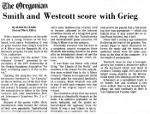Smith and Wescott Score with Grieg

With a pianist-conductor on the podium and a young virtuoso at the keyboard, both native Portlanders, it was no great surprise that Grieg's Concerto in A Minor was the Romantic hit of a Romantic program Tuesday night in the Civic Auditorium.
The occasion was the annual "Contributor's Concert" presented in appreciation of the 1977 membership of the Oregon Symphony Association "for their continuing support of the orchestra."
Opening the program was the effervescent Overture to "La Corsaire" by Hector Berlioz, one of the most flamboyant of the great Romantics of the last century. It suitably set the mood for the romanticism to follow on the Grieg Concerto and, after intermission, Robert Schumann's Symphony No. 2 in C Major.
Because of the genius within them, masterpieces often become the victims of their own popularity. Sophisticated listeners, through repeated hearings and often some tasteless pop versions, tend to become calloused to the inherent breathless beauty of a recognized great work. Along with the Tschaikowsky and Rachmaninoff piano concertos, the Grieg A Minor is in this category.
Practically everyone who has been to a symphony concert recognizes those dramatic descending chords in the piano after an introduction drum roll and the even more familiar theme which follows.
It was Hans von Bulow who called Grieg "the Chopin of the North" and nowhere is the reason for this appellation more evident than in the A Minor Concerto. Thanks to an approach which brushed aside the encrusted familiarity of a century, Mark Westcott was able to play it with such romantic brio that much of the original impact was recreated.
The conclusion of the first movement is almost as climatically dramatic as the finale. The audience applauded, as the music indicated, and the pianist acknowledged the applause from the bench. It was a real tribute to his individuality as a conductor that Smith indicated to the pianist that a full standing bow was appropriate - which was happily done. It may sound like an insignificant incident, but it isn't.
About half a century ago conductors (Following the lead of the greatest, Toscanini) began to inject themselves between the music and the reactions of audiences which were the same reactions in the time of the composer. It is the height of presumption.
Westcott, since he was a teen-ager, always has created a distinctive poetry at the keyboard which was much in evidence Tuesday night. He's one of the bright young pianists on the international scene who should go all the way.
Schumann as a symphonist tends to be loosely knit and nowhere is this more evident than in his Second Symphony, but such continuity as there is was emphasized Tuesday night.
Martin Clark
Copied by Ben Serna-Grey
comments powered by Disqus